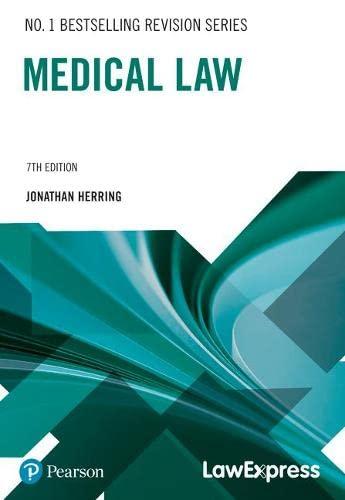Question
Question 1: What do federal administrative agencies do? a) They enact regulations. b) They adjudicate claims. c) They investigate. d) All of the above Question
Question 1: What do federal administrative agencies do?
a) They enact regulations.
b) They adjudicate claims.
c) They investigate.
d) All of the above
Question 2: How can Congress provide federal administrative agencies with the power to make regulations without violating separation of powers principles?
a) By giving the agency unfettered discretion to make regulations.
b) By overruling regulations that are improper with a legislative veto.
c) By establishing boundaries for the scope of the regulations.
d) By giving the President the power to investigate and remove agency officials.
Question 3: Why did the Court rule that the legislative veto was unconstitutional in INS v. Chadha?
a) Because Congress cannot interfere with executive powers.
b) Because it was legislative action that did not meet the bicameralism and presentment requirements.
c) Because Congress cannot overturn a decision by the Attorney General.
d) None of the above.
Question 4: What is the difference between an inferior and principal officer?
a) An inferior officer must be nominated by the President and confirmed by the Senate.
b) Only the courts can appoint an inferior officer.
c) A principal officer is nominated by the President and confirmed by the Senate.
d) Only Congress can appoint a principal officer.
Question 5: Why did the Court determine that the independent counsel position was an inferior officer inMorrison v. Olson?
a) Because the independent counsel was subject to removal by the Attorney General.
b) Because the independent counsel had the power to perform only limited duties.
c) Because the independent counsel had limited jurisdiction and limited tenure.
d) All of the above.
Question 6: Why were limitations on the President's removal powers unconstitutional in Myers v. United States, but constitutional in Humphrey's Executor v. United States?
a) Because both cases involved principal officers.
b) Because the Humphrey's Executor v. United States
involved an independent agency with quasi-judicial and quasi-legislative powers.
c) Because both interfered with the core functions of the Executive Branch.
d) All of the above.
Question 7: Under the core functions test,
a) Congress may not impose any limits on the President's ability to remove principal officers.
b) Congress may impose any limits it sees fit on the President's ability to remove inferior officers.
c) Congressional limitations cannot interfere with the President's ability to exercise the core functions of executive power.
d) None of the above.
Question 8: Congress creates a new federal agency. A position at the agency reports to the Director of the agency and is responsible for running a division of the agency that has wide ranging responsibilities. The President may remove the person for good cause only. The limitation on the President's ability to remove is
a) Constitutional if the agency is an independent agency.
b) Constitutional if the agency is a dependent agency.
c) Unconstitutional if the position is a principal officer.
d) Unconstitutional if the position is an inferior officer.
Step by Step Solution
There are 3 Steps involved in it
Step: 1

Get Instant Access to Expert-Tailored Solutions
See step-by-step solutions with expert insights and AI powered tools for academic success
Step: 2

Step: 3

Ace Your Homework with AI
Get the answers you need in no time with our AI-driven, step-by-step assistance
Get Started


